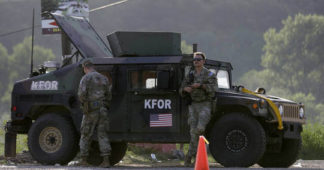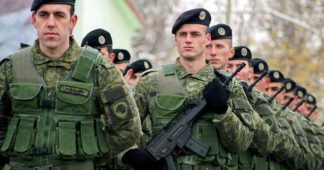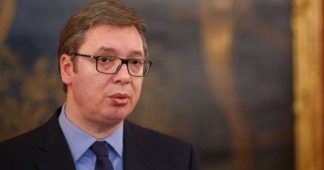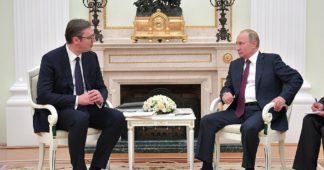RT.com
31 Dec 2022
Celebrating a collaborator with Hitler’s Germany shows Pristina’s sympathies, Serbian President Aleksandar Vucic has said
The true beliefs of Kosovo’s ethnic Albanian prime minister are clear from his push to restore the home of a German spy and Nazi collaborator from the Second World War, Serbian President Aleksandar Vucic said on Friday.
Speaking with reporters in Belgrade, Vucic pointed out that the government of Albin Kurti is restoring the house of “Nazi war criminal” Xhafer Deva in Kosovska Mitrovica.
“This is why they put up monuments to, and brag about the Ballist movement being their past, present and future,” Vucic said, referring to the World War II Albanian nationalist movement Balli Kombetar (National Front). “Nazism. The ‘great’ Xhafer Deva – a war criminal, who persecuted Serbs, Jews and all others.”
Deva was minister of the interior in the pro-German government of Albania, set up in 1943, and a founder of the Second League of Prizren, an Albanian nationalist organization. After the war, he fled to the US, where he worked with the CIA and launched the Third League of Prizren. Both leagues were modeled after the 1889 original, which sought to establish a greater Albanian state and claimed territories belonging to present-day Serbia, Montenegro, Greece and North Macedonia.
Kurti’s Vetevendosje party advocates for such a “Natural Albania” and he has been photographed with maps of its envisioned borders. Between that and Kurti’s fondness for former Albanian strongman Enver Hoxha, it’s little wonder he and current Albanian PM Edi Rama don’t get along, Vucic argued.
“He wants to be a bit of Enver Hoxha and a bit of [Vladimir] Zelensky,” Vucic told reporters, referring to the president of Ukraine, a darling of numerous Western mainstream media outlets and governments. “But all he can do is dream these dreams.”
The Serbian president spoke after meeting with Nikola Nedeljkovic, a 20-year-old Serb who had been jailed in Kosovo for “inciting ethnic hatred,” over a T-shirt that showed the breakaway province as part of Serbia.
NATO took control of Kosovo in 1999, after months-long bombing of Serbia on behalf of ethnic Albanian insurgents. The province’s provisional government declared independence in 2008, with US and EU backing. With support from Russia and China, Serbia has resisted pressure to recognize it ever since.
We remind our readers that publication of articles on our site does not mean that we agree with what is written. Our policy is to publish anything which we consider of interest, so as to assist our readers in forming their opinions. Sometimes we even publish articles with which we totally disagree, since we believe it is important for our readers to be informed on as wide a spectrum of views as possible.










